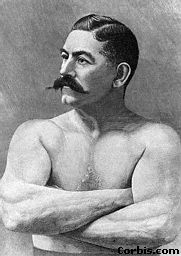| Home |
| Companies |
| People |
| Places |
| Organizations |
| Events |
| Other |

John L. Sullivan John Lawrence Sullivan was born on October 15, 1858, in Roxbury, Massachusetts. His parents were
Irish immigrants, Michael and Catherine Sullivan. He had a sister, Ann, and a brother, Mike.
John Lawrence Sullivan was born on October 15, 1858, in Roxbury, Massachusetts. His parents were
Irish immigrants, Michael and Catherine Sullivan. He had a sister, Ann, and a brother, Mike.
Sullivan graduated from grammar school at the age of sixteen, with the equivalent of a junior high school education. He worked as a plumber's assistant, a hod carrier, and later, as a tinsmith. He liked sports, and reportedly received several offers to play professional baseball -- one from the Cincinnati Red Stockings. However, a casual invitation to box in a Boston theater, at the age of nineteen, led to an illustrious career as a pugilist. Sullivan looked the part of a fighter. He was 5 feet, 10 1/2 inches tall and weighed 195 pounds, when in his best condition. He was black-haired and barrel-chested, with a scowling countenance and a gruff voice. He allegedly could hit "hard enough to knock a horse down", and soon earned the nickname, "The Boston Strong Boy." To his detriment, he smoked big black cigars and had a monstrous appetite, which often caused his weight to spiral out of control. A fast-living, hard-drinking man, it is said that he drank bourbon out of beer steins. By 1882, Sullivan felt experienced enough to take on American heavyweight champion, Paddy Ryan, and on February 7 of that year, he and Ryan fought a bare-knuckle bout on the lawn of the Barnes Hotel in Mississippi City, Mississippi. Sullivan won the championship, knocking Ryan out in the ninth round. Sullivan was the first American fighter to gain national recognition. His defeat of Ryan elevated him to heights of popularity previously unheard of in the sports world. He toured the world with a standing offer of $50.00 (later raised to $1000) to any man who could last four rounds with him. However, he harbored fierce hostility toward foreigners, and flatly refused to face black fighters. Such was his popularity, that on August 8, 1887, his hometown fans presented him with a $10,000 championship belt, in an elaborate ceremony at the Boston Theater. By this time, he had been tagged, "The Great John L.," by his adoring fans. Sullivan's boxing career ended on September 7, 1892, when "Gentleman" Jim Corbett knocked him out in the twenty-first round of a bout staged in New Orleans. Not counting exhibition bouts, he had compiled a record of forty-seven wins, one loss, and three draws. Twenty-nine of his wins were by knockout, and fourteen by decision. For the next several years, he engaged in a number of activities: he toured the United States, Canada, and Australia, acting in plays; he and Jake Kilrain toured the vaudeville circuit, briefly, presenting exhibition bouts; he opened a bar in New York, and bought an interest in a saloon in Boston. At one time, there was even talk of running him for Congress. In 1883, Sullivan married chorus girl, Annie Bates. A son, John Jr., was born in 1884, but the child died of diphtheria in 1886. John L. separated from Annie in 1885, and lived openly with burlesque queen, Ann Livingston. He finally divorced Annie in 1908, and married his childhood sweetheart, Kate Harkins. Under Kate's influence, he gave up his decadent life style and became a temperance lecturer. And in 1912, he and Kate bought Donlee-Ross Farm in West Abington, Massachusetts, where they raised fruits, vegetables, and chickens. Sullivan was a big-hearted man. He provided for his parents, contributed regularly to charities, and routinely gave wood, coal, and flour to the poor people of Boston. He loved animals, especially dogs, and he was fiercely patriotic. He was also a bona fide eccentric. A flashy dresser, he was often called a "walking rainbow." He loved to chase fire engines, and was fascinated by condemned men. On his way to the Paddy Ryan fight in 1882, he stopped in Washington, D.C. to visit Charles Guiteau, who was in jail, accused of assassinating President James A. Garfield. John L. Sullivan died of a heart attack on February 2, 1918, at his farm in West Abington. He is buried in Mount Calvary Cemetery, near there. |